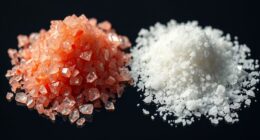A chemistry career often starts in traditional lab roles, where you gain hands-on experience with analysis, research, and teamwork. You can then move into industry or manufacturing, applying your skills to product development, quality control, or process optimization. Emerging sectors like green chemistry, advanced materials, and digital technologies offer exciting opportunities. Continuous education, certifications, and adapting to new trends help you stay competitive. Keep exploring to discover how to advance from lab work to impactful industry roles.
Key Takeaways
- Entry-level chemists typically start in research, quality control, or laboratory technician roles within various industries.
- Advanced degrees and specialized certifications open pathways to management, consulting, or R&D leadership positions.
- Skills in data analysis, instrumentation, and safety protocols are vital for transitioning from lab work to industry roles.
- Industry sectors like pharmaceuticals, food science, green chemistry, and materials develop diverse career opportunities.
- Continuing education, industry experience, and digital literacy facilitate career progression from laboratory roles to industry leadership.
Exploring Traditional Laboratory Roles

Traditional laboratory roles are fundamental to a chemist’s career, involving hands-on experimentation and analysis in a controlled environment. You’ll develop key skills like conducting qualitative and quantitative analyses, designing experiments, and interpreting data.
Hands-on experimentation and data analysis are essential skills in traditional chemistry laboratory roles.
Working in labs, you’ll handle tasks such as developing new products, materials, and expanding scientific knowledge through research. Most positions require at least a bachelor’s degree in chemistry or a related field, with advanced degrees opening doors to senior roles.
Your professional goals will focus on advancing scientific understanding and contributing to innovative solutions. In these roles, you’ll use equipment like spectrometers and chromatographs to analyze substances.
The work environment emphasizes precision, safety, and collaboration, essential for producing reliable results and supporting ongoing scientific progress.
Transitioning Into Industry and Manufacturing

Transition moving into industry and manufacturing offers chemists the opportunity to apply their skills in real-world applications, contributing to product development, quality control, and process optimization. Job growth is steady, with about 7,200 openings annually, though some roles are declining due to macroeconomic shifts and technological advances.
The chemical industry experienced slight employment growth but also significant job cuts, illustrating sector volatility. To succeed, you need strong STEM skills, practical experience through internships, and transferable abilities like problem-solving and collaboration. Developing a solid understanding of industry-specific regulations can also give you a competitive edge. Familiarity with emerging green chemistry and digital technologies gives you an edge. Continuous learning is essential, as sector demands evolve rapidly. While traditional manufacturing roles shrink, opportunities in food manufacturing, scientific research, and green chemistry are expanding, offering new pathways into industry. Supporting career development and staying informed about industry trends can significantly enhance your adaptability and success in this dynamic field. Additionally, understanding self-watering plant pot technology can highlight innovative applications of chemistry in everyday products. Moreover, cultivating a creative practice mindset can foster innovative problem-solving approaches crucial for adapting to technological changes in the industry. Staying current with the latest developments in industry-specific innovations can help you remain competitive and open to new career opportunities.
Emerging Sectors Shaping Chemistry Careers

Emerging sectors are rapidly transforming chemistry careers by creating new opportunities for innovation and specialization. In energy shift and sustainability, you can work on advanced materials for batteries, hydrogen fuels, or recyclable chemicals that support a circular economy.
Emerging sectors revolutionize chemistry careers through innovative roles in sustainability and advanced materials.
Decarbonization strategies offer roles in reducing industrial carbon footprints, while water purification innovations address global clean water needs. Incorporating advanced filtration techniques can further enhance water treatment solutions and improve efficiency. Staying updated on filtering technologies is vital for developing more effective and sustainable purification methods.
Advanced materials and nanotechnology open doors in designing high-performance polymers, nanomaterials, and smart coatings for aerospace and healthcare. Staying informed about nanomaterial safety is essential to ensure responsible development and application.
Personalized consumer goods now demand expertise in biodegradable formulations, AI-driven skincare, and sustainable packaging.
Additionally, AI and digital transformation provide roles in process automation, predictive maintenance, and data-driven product development. Understanding regulatory requirements is crucial to ensure compliance and safety in these innovative fields.
In these sectors, your skills directly impact societal challenges like clean energy, environmental protection, and sustainable living.
Specialized Certifications and Continuing Education

Pursuing specialized certifications and continuing education can considerably enhance your chemistry career by validating your expertise and opening new opportunities. Certifications like the Certified Chemical Engineer (CCE), Certified Professional Chemist (CPC), and Licensed Professional Engineer (LPE) demonstrate your skills and commitment, often leading to management or consulting roles. Many certifications require ongoing professional development, such as CEUs or activities like conference attendance, ensuring your knowledge stays current. Industry-specific training, including process safety, regulatory compliance, and ISO standards, further boosts your qualifications. Utilizing AI-driven content clusters can help you identify the most relevant skills and certifications to pursue, ensuring your professional development efforts are aligned with industry demand. These credentials can improve your salary prospects—certified engineers typically earn 10-20% more—and facilitate international collaboration through recognized standards. Staying committed to education and certification guarantees you remain competitive and adaptable in a constantly evolving industry landscape. Additionally, staying informed about Vegetable Juices and other health trends can open interdisciplinary opportunities, especially in food safety and nutritional sciences, further expanding your career options. Moreover, understanding the latest refrigeration technology can be beneficial in industries related to food storage and preservation. Recognizing the importance of Narcissistic behaviors can also be useful when navigating team dynamics and leadership roles in technical environments. Developing expertise in regulatory compliance is increasingly crucial as industries face tightening regulations worldwide.
Non-Traditional Career Opportunities in Chemistry

You can work in sustainability and green chemistry, developing biodegradable materials, designing energy-efficient processes, or creating carbon capture technologies to reduce industrial emissions. These innovative approaches often require interdisciplinary knowledge and advanced laboratory skills, making them a dynamic and impactful choice for chemists. Additionally, staying current with emerging scientific techniques can enhance your ability to innovate within these fields. Keeping abreast of zodiac compatibility insights can also foster better teamwork and collaboration in diverse research environments. Regulatory consulting offers a chance to help companies comply with environmental laws, promoting sustainability. In cosmetic chemistry, you might formulate vegan or organic products, engineer microorganisms for natural fragrances, or develop biodegradable exfoliants to replace microplastics. Scientific journalism allows you to communicate complex research through technical writing, podcasts, or infographics, making science accessible. Technical sales and marketing let you showcase innovative products, educate clients on eco-friendly solutions, and negotiate deals. Ultimately, applied fields like forensic chemistry, food science, art conservation, wastewater management, and fashion chemistry present diverse, impactful options outside traditional roles. Additionally, understanding Ice Cream terminology and flavor trends can be valuable for those involved in food science or product development within the chemistry industry. Exploring industry-specific regulations can further enhance your ability to navigate compliance and ethical standards in these careers.
Overcoming Workforce Challenges and Skill Gaps

Addressing workforce challenges and skill gaps in the chemistry industry requires targeted efforts to align education and training with evolving industry demands. You need to focus on updating curricula to emphasize practical, real-world applications, especially in green energy, advanced materials, and digital skills like AI and machine learning. Incorporating personal development techniques such as goal setting and self-reflection can help workers adapt to rapid technological changes. Expanding vocational training and apprenticeships can bridge the gap between academic knowledge and hands-on experience. Industry collaborations with universities help develop specialized skills in decarbonization and environmental chemistry. Reskilling existing workers for sustainability and digital roles is vital, along with attracting diverse talent through competitive salaries and remote work options. Overcoming barriers like AI implementation and cybersecurity requires investing in digital literacy and hybrid expertise. Developing a project-based approach to training can enhance practical skills and industry readiness. Additionally, integrating the latest AI-driven tools in training programs can further accelerate skill acquisition. These strategies will help close skill gaps and meet the future needs of the industry.
Frequently Asked Questions
What Are the Highest-Paying Chemistry Careers Outside of Research Roles?
You’re curious about high-paying chemistry careers outside research. Consider becoming a pharmaceutical chemist or chemistry engineer; both roles often pay over $100,000 annually, focusing on drug development and process design.
You could also explore roles like materials scientist or hazardous material manager, which involve developing new materials or handling dangerous substances safely. These careers leverage your analytical skills and advanced education, offering lucrative opportunities beyond traditional research paths.
How Can International Students Transition Into U.S. Chemistry Industries?
Think of your journey as planting a seed that grows into a thriving tree. To shift into U.S. chemistry industries, you need to nurture it with networking, internships, and continuous learning.
Attend conferences, seek mentorship, and stay adaptable. Overcoming visa and language barriers is essential.
With perseverance and strategic effort, you’ll branch out into rewarding roles in industry, turning your potential into a flourishing career.
What Skills Are Most in Demand for Chemistry Jobs in Renewable Energy Sectors?
You need to focus on skills most in demand in renewable energy sectors. Master electrochemistry and materials science to improve batteries and energy storage.
Develop process engineering and biochemical expertise for bioenergy and hydrogen production.
Enhance your data analysis and thermodynamics knowledge to optimize systems.
Learning AI/ML tools and understanding environmental regulations will make you stand out.
Strong project management and safety protocol skills are also vital for advancing in this rapidly growing industry.
How Do Part-Time or Online Chemistry Programs Impact Career Advancement?
They say “timing is everything,” and that’s true for online or part-time chemistry programs too. You can advance your career by gaining flexible education, applying skills immediately, and earning certifications recognized by employers.
While online studies might limit hands-on experience, combining them with internships or networking through professional organizations boosts your growth. Stay proactive, leverage your skills, and remember that persistence often pays off in the long run.
What Are Emerging Job Opportunities in Green Chemistry and Sustainability?
You’re likely to find exciting opportunities in green chemistry and sustainability as the market grows. Roles in renewable energy materials, eco-friendly product development, and waste reduction strategies are expanding.
You can work on bio-based feedstocks, sustainable agriculture, or biodegradable cosmetics. Your skills in regulatory compliance and interdisciplinary collaboration will be highly valued.
Stay updated on new research and industry trends to position yourself for emerging jobs in this impactful, evolving field.
Conclusion
Your chemistry journey is like charting a vast ocean of opportunities. Whether you stay in the lab, explore industry, or investigate emerging sectors, each course adds to your map. With specialized certifications and continuous learning, you’ll steer confidently through workforce challenges and skill gaps. Remember, your career isn’t a straight line but a dynamic voyage—embrace the waves of change and chart your unique course to success.









